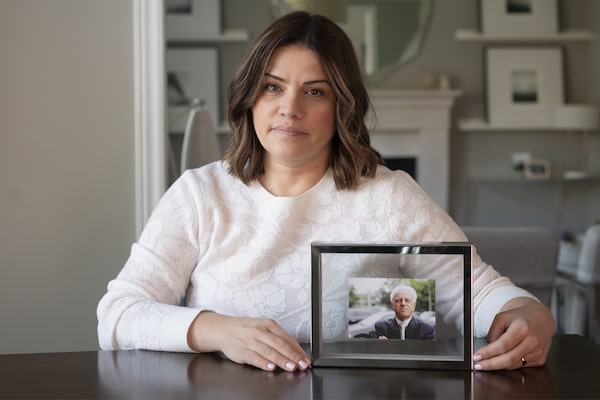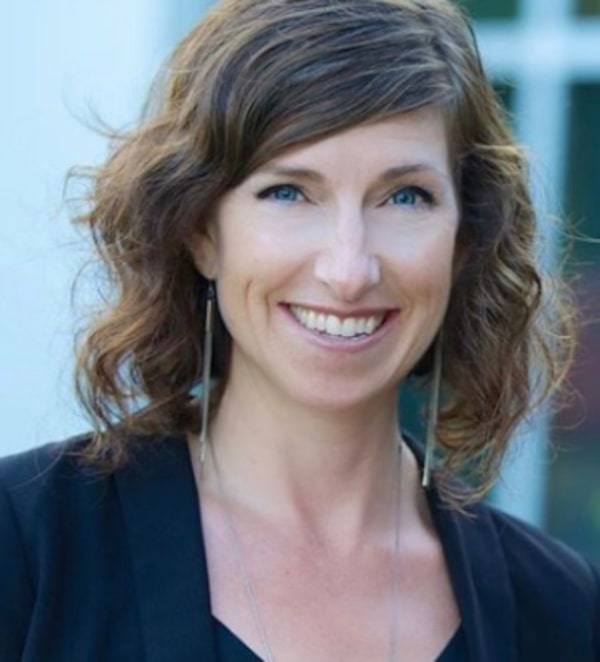
Laura Martire of Vaughan, Ont., holds a photo of her father, Joe Donadio, who passed away in 2016 from acute myeloid leukemia.Tijana Martin
Laura Martire, 48, of Vaughan, Ont., remembers feeling conflicting emotions during a family dinner the weekend before her father, Joe Donadio, was scheduled to start chemotherapy for acute myeloid leukemia.
She felt joy spending time with the people she loved dearly and hope that his treatment would succeed – as well as fear and sadness.
“In the back of my mind there was this awful feeling of, ‘How many more of these [dinners] might we have?’” recalls Martire, who was her father’s primary caregiver throughout his illness.
One of her most treasured memories is a family getaway just before her dad underwent a stem cell transplant. While she remembers that time together fondly, she also remembers the difficult emotions she faced. “There was this sick feeling in my stomach that this will probably be our last [trip with him],” she says.
That dread and worry about what the future might hold is called anticipatory grief, says C. Elizabeth Dougherty, a palliative care psychosocial clinician and educator in Burlington, Ont., who primarily works with families facing a cancer diagnosis.
Contrary to what many of us might think, it is normal for someone in Martire’s situation to “grieve while the person [they love] is still alive,” Dougherty says.

C. Elizabeth Dougherty, palliative care psychosocial clinician and educator based in Burlington, Ont.Supplied
Adjusting to a series of losses
Regardless of whether a loved one’s prognosis is poor or their treatment is expected to be curative, says Dougherty, “there is worry about someone’s dying.” In fact, no matter what the expected outcome, cancer involves a long series of losses to which grief is a natural response, she adds.
For instance, being diagnosed with a potentially life-threatening blood cancer can shatter someone’s long-held view of what their future would hold and can lead to depression and anxiety. Close friends may pull away to avoid witnessing the person they love grappling with these difficult emotions.
Anticipatory grief is about mourning the loss – imagined or real – of experiences, possibilities or a future together. While the concept has been around a long time – coined in 1944 by German-American psychiatrist and bereavement specialist Erich Lindemann – anticipatory grief is not often understood or discussed.
That includes people responsible for treating the disease, says Dougherty. “Health-care providers don’t get standard training and education about grief and loss and what it looks like” in people with cancer and their loved ones, she notes. “Someone with a cancer diagnosis will receive support and treatment for nausea and vomiting, or physical pain, but the emotional, social and spiritual impact, which is very real, doesn’t receive the same attention.”
Often both the person who’s been diagnosed and his/her loved one(s) will try to hide their uncertainty, fears and anxieties from one another. “Most of the people I work with try to protect the people they love – they don’t want them to worry, and they don’t want to be a burden. That’s true for the person living with a cancer diagnosis, and it’s also true whether it’s their spouse, or a sibling, or their children or their parent,” Dougherty says.
Martire says she can relate to those feelings, both from her own perspective and from that of her father when he was living with cancer. While that time in her life was often lonely and overwhelming, she says, “you tend to be a bit guarded about sharing your deepest feelings [with your loved one] because you don’t want to add to their pain.”
Martire remembers how she and her father would try to protect each other during difficult moments.
“Something my father would say to me every day, especially when we got pummelled with bad news, was, ‘Let’s just do today. We’ll figure out tomorrow, tomorrow.’ That kind of became our mantra,” she says.
Dougherty says it’s common for people on both sides to feel an unspoken pressure to express only positive emotions, such as hope or optimism, or try to project what’s widely misperceived as “strength” by not showing vulnerability. “Many people feel they need to be stoic or push grieving aside,” she says.
Martire recalls that when she and her father were in doctor’s appointments, “My father would tap me on the leg sometimes when we were getting bad news. I always knew that was his sign for, ‘I can’t – I’m zoning out right now.’ So I knew [that meant], ‘Okay, get yourself together – you have to be there for him,’” she says. “I always had this awareness of the importance of my role, and making sure he was able to express how he was feeling, or that he didn’t feel pressured to do treatments that he didn’t want to do.”
The end result of being stoic and pushing aside grief? “What I often see is this profound isolation,” Dougherty says, which can amplify suffering during an incredibly difficult time.
The right kind of support can lessen – not eliminate – the burden of anticipatory grief, says Dougherty. Support can even help foster post-traumatic growth, which is positive psychological change that can result from traumatic life experiences.
Connecting with others who don’t judge
Learning that anticipatory grief is not due to failure or weakness – rather, an understandable and natural response to a life-altering experience – can ease some of the associated distress, says Dougherty. The next step is finding some way of connecting with others that suits an individual’s preferred coping style.
“We know that connecting and community can help someone process and metabolize traumatic experiences and move forward,” she explains. That can involve talking with others, as well as resources such as books, blogs and podcasts.
The Leukemia & Lymphoma Society of Canada (LLSC) offers a wealth of support services and resources for individuals with blood cancer and their loved ones. One of the most effective supports for people dealing with anticipatory grief is the LLSC’s First Connection Support Program. The free service connects caregivers with trained volunteers who have been in similar roles supporting their loved one through a blood cancer experience.
Caregivers may be matched by age, type of diagnosis, gender or the issue that is of most concern. Volunteers are trained to listen and offer insights informed by their own experiences.
Dougherty says the support offered by organizations like the LLSC can be extremely valuable because it enables people to “connect with voices of others who don’t judge,” she says.
“It’s not about fixing or curing. We can’t cheer people up out of these experiences,” she adds. “It’s simply giving people space to feel what they need to feel, whether that is sadness, anger or anxiety.”
Martire, who is a volunteer with First Connection, says the program offers caregivers a chance to get questions answered or “have somebody just listen.” Looking back, she thinks she would have benefitted from talking to others who could relate to her experiences when she was caring for her father, who passed away at the age of 69 in 2016.
“Sometimes the people who were closest to me and loved me the most couldn’t necessarily be there in the way I needed them to be in that moment; not because they didn’t love me, but because they hadn’t gone through [it themselves],” she says.
“That’s the reason it’s so important for me to be connected with The Leukemia & Lymphoma Society of Canada,” she adds, “so that when other people are blindsided and going through this for the first time, they have somebody to talk to who knows what they’re going through.”
Are you struggling with grief or other difficult emotions due to the blood cancer diagnosis of a loved one? The Leukemia & Lymphoma Society of Canada can connect you with resources such as their First Connection Support Program. For more information contact the LLSC’s Community Services team at 1-833-222-4884, info@bloodcancers.ca or visit bloodcancers.ca.
By the numbers
- Every 24 minutes, someone in Canada is diagnosed with a blood cancer
- Blood cancers can strike anyone, at any age, without warning
- More than 155,000 Canadians are affected by 137 different blood cancers
- 40 per cent of all childhood cancers are blood cancers
- There are five main types of blood cancers: leukemia, lymphoma, myeloma, myelodysplastic syndromes and myeloproliferative neoplasms
- Blood cancers are the third leading cause of cancer death in men and fourth in women, in Canada
- As a result of scientific research and better treatments, survival rates for blood cancers have doubled, tripled and even quadrupled since the 1960s
All information taken from bloodcancers.ca
Advertising feature produced by Globe Content Studio with The Leukemia & Lymphoma Society of Canada. The Globe’s editorial department was not involved.